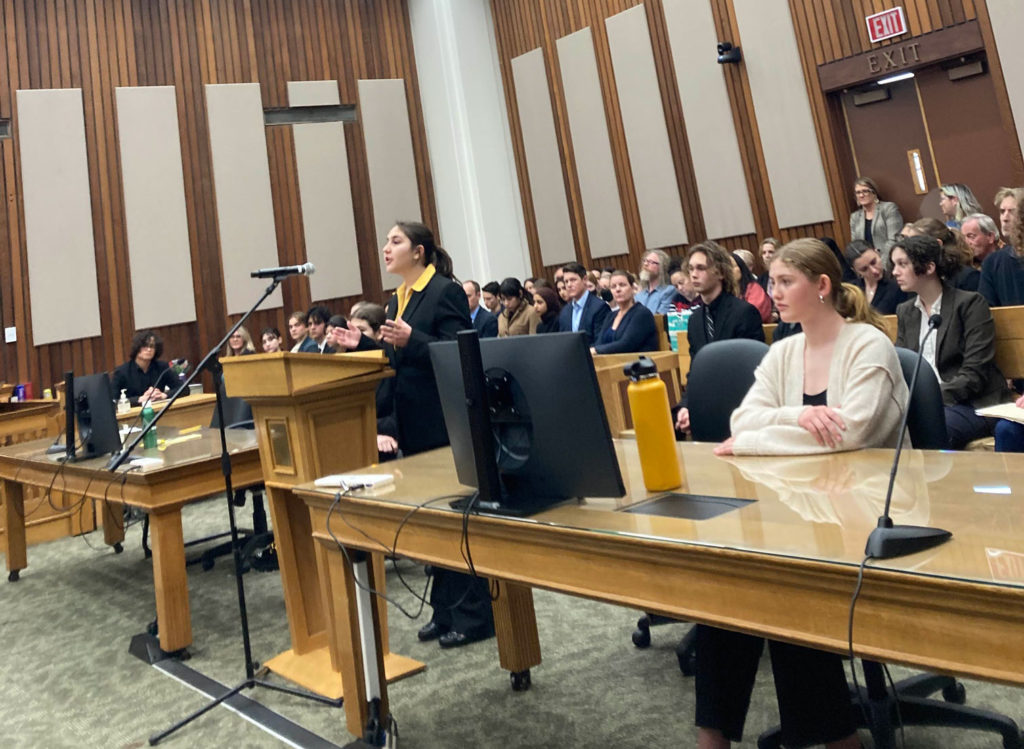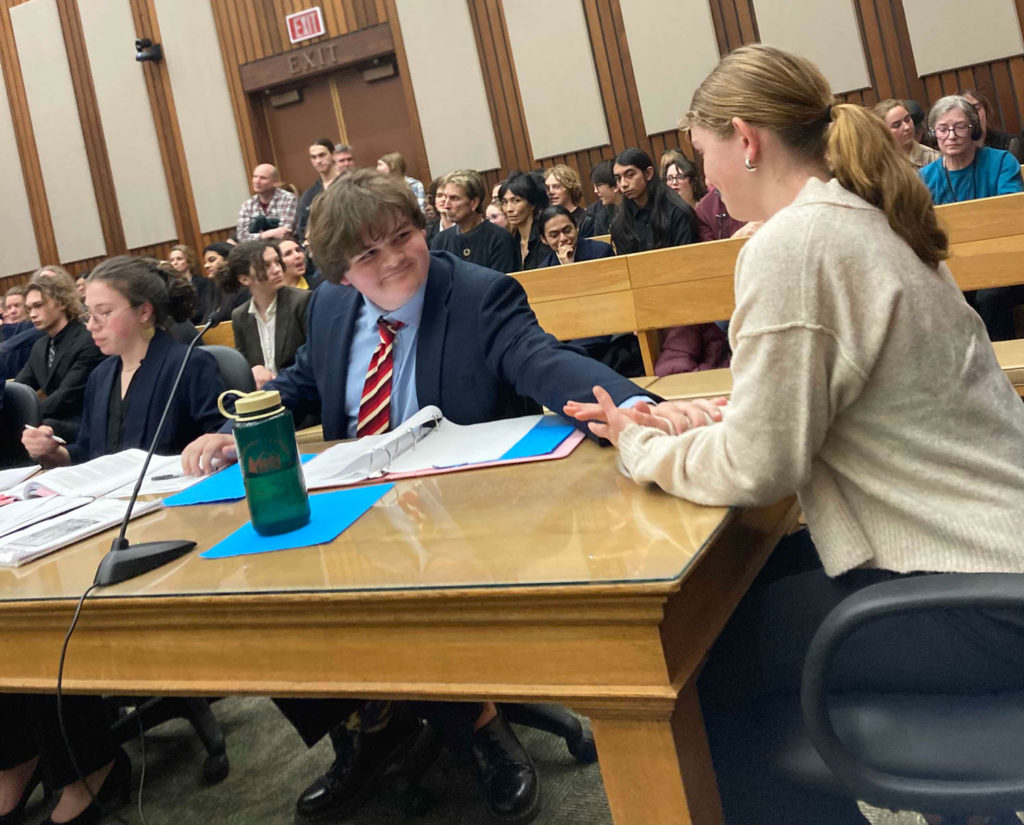
Their client was found guilty of first-degree murder, but they did such a good job of putting up a defense that they’re now headed to state. Santa Cruz High School’s mock trial team hugged one another, after Santa Cruz County Superior Court Judge Syda Cogliati broke the tie with Pacific Collegiate School’s prosecutors Feb. 22, even though she’d just found Tobie Clark (played by Hayden Kriege) had, in fact, killed a fictional biomedical executive.
“It just feels so exciting,” said Samuel Attard, 17, who played a defense attorney. “It’s our senior year as well.”
The team from Scotts Valley, led by captain Cheyenne Janisch, was handed the Best Team Sportsmanship award at the conclusion of the 2024 Santa Cruz County Mock Trial, which aims to build awareness about the judicial system.
Their bailiff, Raffi Pehlivanian, was deemed the best student to have taken on that role.
“Raffi managed the courtroom with authority,” said Cogliati, commending him for his professional and joyful demeanor. “He commanded attention and control of the court.”

Lillian Chapman, from the local squad, was also recognized, for her turn as defense witness Parker Turner—a forensic pathologist who testified about loose fibers and fingerprint evidence found at the scene of the crime.
Cogliati explained that Chapman had remained so “natural and comfortable” that it was “as if she had indeed testified in many cases previously.”
Scotts Valley’s Lydia Richards was honored as Best Defense Pretrial Attorney.
The school names were kept private until the very end, to help eliminate the potential for bias during the judging.
The annual mock trial competition is coordinated by the Santa Cruz County Office of Education and organized by Teach Democracy (formally known as Constitutional Rights Foundation) with the help of the Santa Cruz County Trial Lawyers Association and the Superior Court of Santa Cruz County.
Even though taking in the final hearing was like watching a courtroom movie come to life, Mary Fukai, an attorney coach who retired from the Santa Cruz County Office of the Public Defender, said it wasn’t scripted.
Students receive a list of facts, case law they need to study and witness statements that are about 2-3 pages long.
“They basically take all of this information and they turn it into direct examinations, cross examinations,” she said.

On that Thursday evening, as People v. Clark got underway to a packed Department 5 around 5:30pm, Judge Cogliati took a moment to acknowledge the effort the teams had put in.
“Congratulations on making it to the final round,” she said, adding, “I know how hard all of you have worked to be here.”
Both sides had four minutes to present their arguments, on top of responding to questions from the judge.
The first order of business was a motion to quash a warrant for cellphone data that had sucked up personal information from dozens of mobile devices.
The young litigators debated the applicability of geofence law established in landmark cases like People v. Meza, United States v. Chatrie, People v. Dawes and Price v. Superior Court (Riverside) to try to gain an advantage.
Students from each side provided on-the-ball responses to tough questioning from the bench on par with anything you might hear during daytime court sessions in the concrete building.
“I’ll grant the motion to suppress the evidence,” the judge decided.
Then it was into opening arguments, with Henry Solomon, who was part of last year’s winning team, setting out why Clark should be convicted—saying the character lied on a patent for a device with harmful effects then killed her business partner after learning he was planning to come clean.
“Tobie Clark wouldn’t let him get away with this,” he said. “Having begun with fraud, she turned to murder.”

The People called four witnesses, and despite the defense efforts to chip away at their credibility, the judge was persuaded to render her first-degree murder decision.
However, thanks in-part to Attard’s precise and well-timed objections, both teams ended up with the exact same score: 641 points.
When Cogliati broke the tie and the courtroom erupted in cheers, Solomon and the rest of the PCS side were left deflated.
In an interview, Sita Kaimal, the mock trial coordinator, said that losing one of these competitions can be difficult to take—especially when it’s so close.
“It’s heartbreaking,” she said. “I’m happy for both of them.”
A new award named after former Scotts Valley mayor and respected Paul Marigonda, who died recently, was also handed out as well.
The honor—for the team that showed excellence in enthusiasm, effort and courage—went to Pajaro Valley High School.
In an email interview, current Scotts Valley mayor Randy Johnson reflected on Marigonda’s infectious laugh and enthusiastic voice.
“Paul had a real joie de vivre,” he said. “Paul was extremely intelligent and had a memory like none other. But when called for, he could be extremely tough and focused—and I really think that was his gift.”











